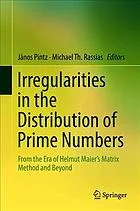Irregularities in the distribution of prime numbers
4.5
Reviews from our users

You Can Ask your questions from this book's AI after Login
Each download or ask from book AI costs 2 points. To earn more free points, please visit the Points Guide Page and complete some valuable actions.Introduction
"Irregularities in the Distribution of Prime Numbers" is a compelling exploration of one of the most fascinating fields in mathematics: the study of prime numbers. For centuries, prime numbers have captivated mathematicians with their enigmatic properties, irregular patterns, and profound implications across various domains of science and technology. In this book, co-authored by János Pintz and Michael Th. Rassias, we delve deep into the complex and beautiful world of prime numbers, unraveling their distribution and the irregularities that define them. The text is structured to appeal to both mathematics enthusiasts and advanced researchers, bridging the gap between historical insights and cutting-edge developments in analytic number theory.
From the ancient Greeks to modern-day number theorists, the study of prime numbers has been at the heart of mathematical inquiry. Yet, their distribution continues to baffle even the most brilliant minds. The book focuses on the irregular behavior of prime numbers, employing a blend of intuition, mathematical rigor, and elegance. Whether you are an academic, a student, or simply curious about the mysteries of mathematics, this book will offer you new perspectives and deepen your appreciation for prime numbers.
Summary of the Book
The book begins with a brief historical overview of prime numbers, tracing their journey from antiquity to modern mathematical research. Early chapters explore the development of elementary results, such as the infinitude of primes, and highlight the pioneering work of brilliant minds such as Euclid, Euler, and Gauss.
The core of the text delves into the irregularities in the distribution of prime numbers, one of the most puzzling aspects of number theory. Topics such as the Prime Number Theorem, the Riemann Hypothesis, and the behavior of primes within arithmetic progressions are studied in depth. A significant portion of the book is devoted to zero-density theorems and their ramifications for understanding the properties of prime numbers.
The authors also shed light on topics like gaps between consecutive primes, small gaps, and large gaps, as well as the elusive twin prime conjecture. Methodologies used include sieve techniques, analytic tools, and probabilistic models, all of which are meticulously explained to ensure clarity. Throughout the book, illustrative examples, exercises, and discussions on unsolved problems emphasize the dynamic and evolving nature of this research area.
The final chapters are dedicated to open challenges and recent progress in prime distribution, underscoring the vibrant activity in the field. Together, these sections paint a vivid picture of why understanding primes and their distribution continues to be one of the most important endeavors in mathematics.
Key Takeaways
- Comprehensive insights into the historical and modern study of prime numbers' distribution.
- Detailed explanations of landmark theorems and advancements, including the Prime Number Theorem and its refinements.
- A rigorous yet accessible exploration of gaps between primes, highlighting both current knowledge and unsolved problems.
- A seamless integration of classical approaches and modern-day breakthroughs in number theory.
- A rich discussion of open questions, inspiring further research and exploration in analytic number theory.
Famous Quotes from the Book
"Prime numbers are the atoms of arithmetic, yet their distribution follows no predictable pattern that we fully comprehend."
"To understand prime numbers is to unravel one of the greatest mysteries of mathematics—a mystery as old as numbers themselves."
"Mathematics is not just about solving problems but about embracing the infinite possibilities and questions yet to unfold."
Why This Book Matters
This book is an essential addition to the library of anyone interested in the fundamental structure of mathematics. Prime numbers lie at the foundation of modern mathematics, and understanding their distribution is critical—not just for theoretical pursuits but also for practical applications such as cryptography, computational algorithms, and secure communications.
János Pintz and Michael Th. Rassias aim to provide readers with both the historical context and the latest research developments, making the text uniquely comprehensive and relevant. By balancing mathematical depth with clarity, the book is designed to be accessible to a broad audience, effectively bridging the gap between undergraduate-level studies and advanced academic research.
At its heart, "Irregularities in the Distribution of Prime Numbers" is a celebration of mathematical discovery. It emphasizes how ceaseless curiosity and diligent research can illuminate even the most enigmatic aspects of our universe. Through this exploration, readers are inspired to not only admire the beauty of mathematics but also contribute to its ongoing legacy.
Free Direct Download
Get Free Access to Download this and other Thousands of Books (Join Now)
For read this book you need PDF Reader Software like Foxit Reader


